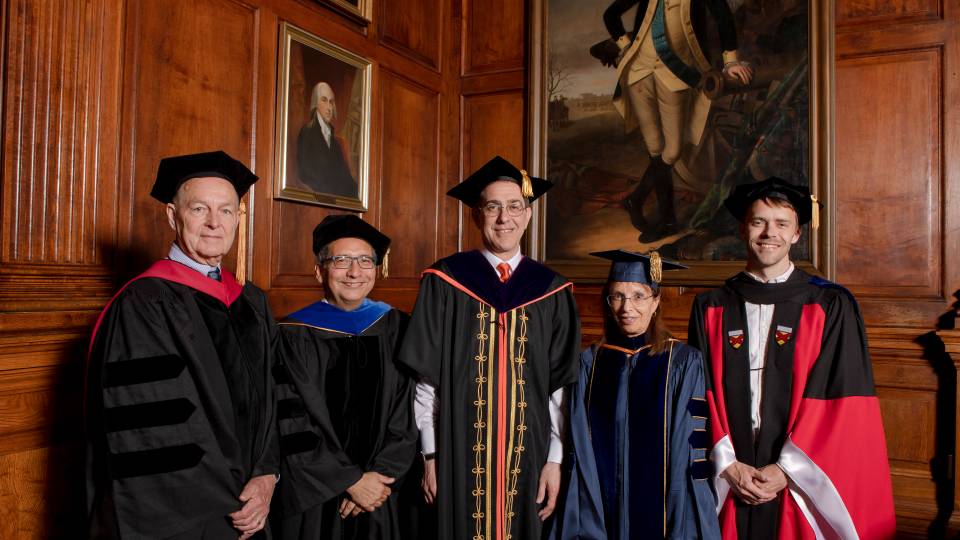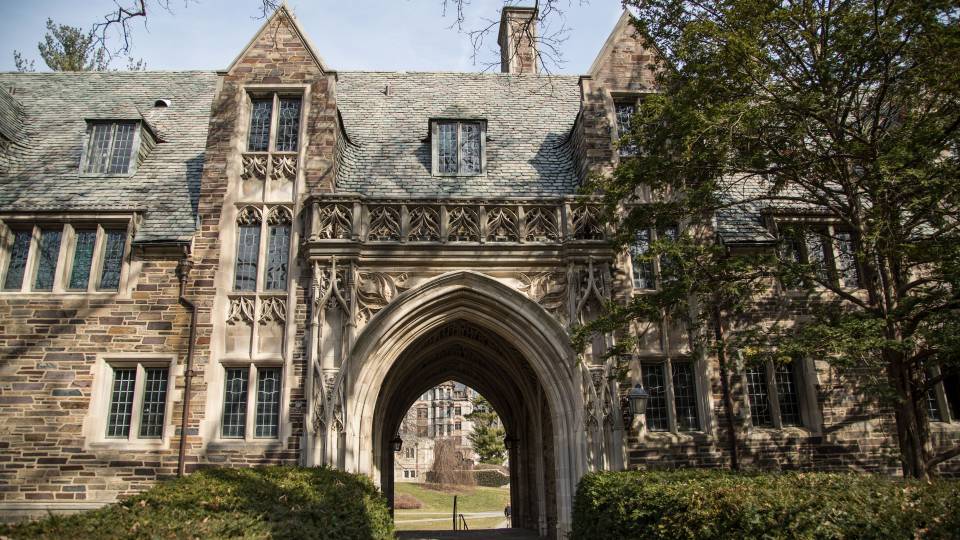Five Princeton University faculty members have been named recipients of the Graduate Mentoring Awards by the McGraw Center for Teaching and Learning and will be honored during the Graduate School's Hooding ceremony Monday, June 2, on Cannon Green.
They are Robert Cava, the Russell Wellman Moore Professor of Chemistry; Sara McLanahan, the William S. Tod Professor of Sociology and Public Affairs; Jacqueline Stone, professor of religion, who will share the honor with Stephen F. Teiser, the D.T. Suzuki Professor in Buddhist Studies and professor of religion; and Sigurd Wagner, professor of electrical engineering.
The McGraw Center, together with the Graduate School, instituted the mentoring award in 2002 to recognize Princeton faculty members whose work with graduate students is particularly outstanding. It is intended to honor faculty members who nurture the intellectual, professional and personal growth of their graduate students.
Graduate students nominate faculty members for the award and, along with faculty members, serve on the committee that selects the winners. The award honors faculty in each academic division (engineering, humanities, natural sciences and social sciences) and includes $1,000 and a commemorative gift.
Cava, who joined the Princeton faculty in 1996, is a leading scientist in the field of materials science, including the study of high-temperature superconductors. Among the classes he teaches are "Topics in Inorganic Chemistry: Symmetry, Diffraction and the Structures of Non-molecular Solids" and "Structural Solid State Chemistry."
In nominating Cava for the award, one student pointed out his attention to each individual student and how helping students through graduate school and into scientific careers is his "number-one priority." The student added that in applying the right kind of pressure to encourage his students, Cava has "created a lab environment that is very productive but also relaxed and happy, which is a unique and wonderful place to work." Reinforcing this sentiment, another student wrote that Cava "always watches out for his students" and "manages to make everyone feel like they belong to a family."
McLanahan, who joined the Princeton faculty in 1990, is director of the Bendheim-Thoman Center for Research on Child Wellbeing. Her research and teaching interests include family demography, poverty and inequality, and social policy.
Students describe McLanahan as an "outstanding" mentor, highlighting her "approachability, reliability and kindness. Wrote one student: "I am often amazed at [Sara's] generosity with her time and with her deep, personal commitment to supporting students. She gives her time, advice and heartfelt opinions without asking for anything in return."
Stone, who came to Princeton in 1990, focuses on Japanese Buddhism. Teiser, a specialist in Chinese Buddhism, joined the Princeton faculty in 1988 and is director of the Program in East Asian Studies. He earned his Ph.D. from the University in 1986. Together, Stone and Teiser are seen by students as "fellow Buddhologists" who have trained dozens of religion scholars.
"Buzzy and Jackie mentor as a team," noted one student. "This allows them to create a harmonious community of budding scholars, instill a transnational vision of East Asian religion, and expose students to diverse methodologies." Added another student: "They pour great energy into writing quality letters of recommendation, giving very detailed feedback on papers, and making themselves available for consultation on every aspect of our academic lives. They are, in short, truly wonderful human beings."
Wagner, who joined the Princeton faculty in 1980, specializes in developing technology for flexible large-area electronics. His research on novel electronic materials includes thin-film solar cells, medical X-ray sensor arrays, electrotextiles and electronic skin. He recently has taught the courses "Selected Topics in Solid-State Electronics: Contemporary Challenges in Electric Power" and "Solar Energy Conversion."
"Professor Wagner has been an impeccable guru in my graduate life at Princeton," one student wrote. "Four years ago when I started working in Professor Wagner's research group, he provided me with ample ear time and intervened at the right junctures to guide me through the world of experimental research." Another student pointed to Wagner's support in encouraging extracurricular activities and being "always willing to chat, whether at 9 a.m. on Sunday or 9 p.m. on weekdays."


